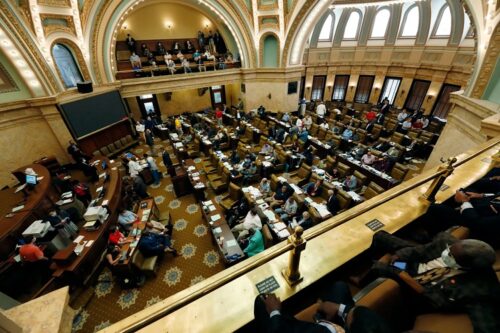
12.29.22 – Clarion Ledger
As millions of Americans are popping bottles of sparkling wine or lighting fireworks into the skies above, members of the Mississippi Legislature may have their minds elsewhere. They will be just days away from reconvening for the 2023 session.
When senators and representatives arrive in Jackson from across the state on Tuesday, Jan. 3, they will do so with bills they’d like to see pass and goals they’d like to accomplish.
Over the next three months, some of those bills will pass. Some of those goals will be accomplished. Many, however, will die in committee, fail on the chamber floor or simply slip between the cracks as time runs out.
Here is a look at some of the biggest issues that are likely to be discussed during the 2023 legislative session.
Rural Hospital Crisis
Mississippi’s rural hospitals are facing a financial crisis, with more than half at risk of closure according to State Health Officer Daniel Edney.
That figure came during a November hearing on the crisis, where state officials and hospital leaders testified as to their dire need for assistance.
The most immediate need seems to be at Greenwood Leflore Hospital, where services have been drastically cut. Leaders at that hospital have told staff they are doing everything they can to hang on until session, when they are hopeful for aid.
Temporary aid to Greenwood and other hospitals will likely be considered during session, but some would like to see discussions go further to include widespread changes to the state’s healthcare system that could make it more profitable and sustainable.
State Income Tax
During last year’s session, Gov. Tate Reeves and a majority of the Mississippi House of Representatives, including Speaker Philip Gunn, pushed for a total elimination of the state’s income tax. However, members of the Senate, led by Lt. Gov. Delbert Hosemann, pushed for a reduction rather than elimination. The ultimate compromise was the largest income tax cut in state history.
That said, Reeves and multiple representatives have vowed to renew the fight for elimination in 2023. Whether Senators will be any more receptive to such a move this time around remains to be seen.
Another disagreement between the two chambers lies with what to do with about $270 million in unused revenue. Hosemann has proposed a tax rebate program, which would give all taxpayers a refund dollar-by-dollar up to the amount they paid, until the surplus is exhausted. That would cap refunds at about $500 for the highest taxpayers, says Hosemann.
Members of the House have been reluctant to support such a rebate, instead painting the surplus as further evidence that the income tax should be eliminated.
A “new pro-life agenda”
In the weeks leading up to the overturn of Roe v. Wade, Reeves penned an op-ed calling for a “new pro-life agenda” that supported mothers and their children.
In the weeks following Mississippi’s trigger law taking effect, when abortion became illegal in almost all cases in the state, leadership in both chambers vowed to look at the issue.
In the Senate, Hosemann formed a Senate Study Committee on Women, Children and Families. Gunn announced he would be forming a “Speaker’s Commission on Life,” made up of experts and stakeholders from across the state.
The Senate committee, chaired by Sen. Nicole Boyd of Oxford, has held four public hearings. The Speaker’s commission has thus far held none, and it is unknown if they have met in any capacity.
One of the key proposals that may come forward to aid women, children and families will likely be extending Medicaid coverage to mothers who are 12 months post-partum. The Senate has passed such legislation a number of times, only for it to fail in the House.
A number of witnesses before the Senate committee testified that it would be beneficial, and Hosemann has cited a study from Texas that found a similar program there to have had a number of positive impacts. Members of the House have criticized such proposals, equating them to Medicaid expansion.
In his budget recommendation, Reeves proposed that Mississippi pass a child tax credit for “as long as we have an income tax.” He also proposed a tax write-off for childcare costs, and an increase in funding to controversial Pregnancy Resource Centers.
Crime
There have been calls from legislators in both chambers to address crime levels in Mississippi, particularly in Jackson.
During an October hearing, Jackson Police Chief James Davis called for the legislature to create a “capitol city crime lab,” which could be used by a number of law enforcement agencies in the Jackson area and reduce backlogs at the state crime lab.
In his budget recommendation, Reeves called for an increase in funding for the Capitol Police, who have expanded their scope drastically during Reeves’ tenure, and have been involved in a number of police-involved shootings this year that are currently under investigation by the Mississippi Buruea of Investigation.
Initiative Petitions
The state of Mississippi’s initiative petition process remains dormant and unworkable, after being struck down by the state supreme court in 2021.
Efforts to revive the process failed during the 2022 session, as the House and Senate could not agree on the number of signatures that should be necessary to get an initiative on the ballot.
It is likely there will be further attempts to revive the initiative process this session, though it is unknown whether majorities in both chambers will support the same language this time around.
Infrastructure
The 2022 session saw a record amount of funds allocated towards infrastructure, buttressed significantly by federal funds. That said, the legislature left about $350 million in federal American Rescue Plan Act funds on the table. Those could be used this session to match local pledges to water and sewer infrastructure, Hosemann said.
